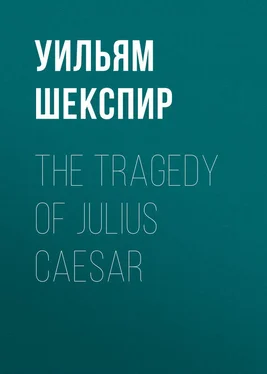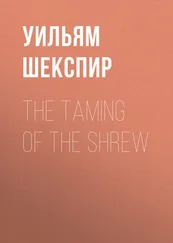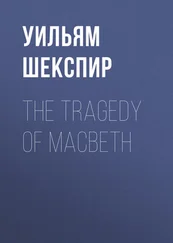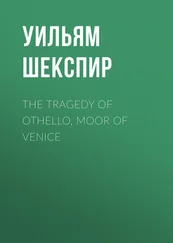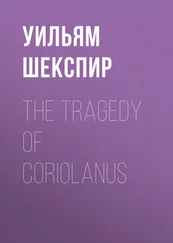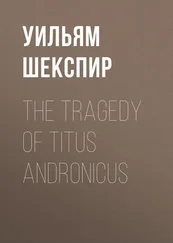Уильям Шекспир - The Tragedy of Julius Caesar
Здесь есть возможность читать онлайн «Уильям Шекспир - The Tragedy of Julius Caesar» — ознакомительный отрывок электронной книги совершенно бесплатно, а после прочтения отрывка купить полную версию. В некоторых случаях можно слушать аудио, скачать через торрент в формате fb2 и присутствует краткое содержание. Жанр: Европейская старинная литература, Драматургия, foreign_dramaturgy, на английском языке. Описание произведения, (предисловие) а так же отзывы посетителей доступны на портале библиотеки ЛибКат.
- Название:The Tragedy of Julius Caesar
- Автор:
- Жанр:
- Год:неизвестен
- ISBN:нет данных
- Рейтинг книги:4 / 5. Голосов: 1
-
Избранное:Добавить в избранное
- Отзывы:
-
Ваша оценка:
- 80
- 1
- 2
- 3
- 4
- 5
The Tragedy of Julius Caesar: краткое содержание, описание и аннотация
Предлагаем к чтению аннотацию, описание, краткое содержание или предисловие (зависит от того, что написал сам автор книги «The Tragedy of Julius Caesar»). Если вы не нашли необходимую информацию о книге — напишите в комментариях, мы постараемся отыскать её.
The Tragedy of Julius Caesar — читать онлайн ознакомительный отрывок
Ниже представлен текст книги, разбитый по страницам. Система сохранения места последней прочитанной страницы, позволяет с удобством читать онлайн бесплатно книгу «The Tragedy of Julius Caesar», без необходимости каждый раз заново искать на чём Вы остановились. Поставьте закладку, и сможете в любой момент перейти на страницу, на которой закончили чтение.
Интервал:
Закладка:
And it is very much lamented, Brutus,
That you have no such mirrors as will turn
Your hidden worthiness into your eye
That you might see your shadow. I have heard
Where many of the best respect in Rome,
Except immortal Caesar, speaking of Brutus
And groaning underneath this age's yoke,
Have wish'd that noble Brutus had his eyes.
BRUTUS. Into what dangers would you lead me, Cassius,
That you would have me seek into myself
For that which is not in me?
CASSIUS. Therefore, good Brutus, be prepared to hear,
And since you know you cannot see yourself
So well as by reflection, I your glass
Will modestly discover to yourself
That of yourself which you yet know not of.
And be not jealous on me, gentle Brutus;
Were I a common laugher, or did use
To stale with ordinary oaths my love
To every new protester, if you know
That I do fawn on men and hug them hard
And after scandal them, or if you know
That I profess myself in banqueting
To all the rout, then hold me dangerous.
Flourish and shout.
BRUTUS. What means this shouting? I do fear the people
Choose Caesar for their king.
CASSIUS. Ay, do you fear it?
Then must I think you would not have it so.
BRUTUS. I would not, Cassius, yet I love him well.
But wherefore do you hold me here so long?
What is it that you would impart to me?
If it be aught toward the general good,
Set honor in one eye and death i' the other
And I will look on both indifferently.
For let the gods so speed me as I love
The name of honor more than I fear death.
CASSIUS. I know that virtue to be in you, Brutus,
As well as I do know your outward favor.
Well, honor is the subject of my story.
I cannot tell what you and other men
Think of this life, but, for my single self,
I had as lief not be as live to be
In awe of such a thing as I myself.
I was born free as Caesar, so were you;
We both have fed as well, and we can both
Endure the winter's cold as well as he.
For once, upon a raw and gusty day,
The troubled Tiber chafing with her shores,
Caesar said to me, "Darest thou, Cassius, now
Leap in with me into this angry flood
And swim to yonder point?" Upon the word,
Accoutred as I was, I plunged in
And bade him follow. So indeed he did.
The torrent roar'd, and we did buffet it
With lusty sinews, throwing it aside
And stemming it with hearts of controversy.
But ere we could arrive the point proposed,
Caesar cried, "Help me, Cassius, or I sink!
I, as Aeneas our great ancestor
Did from the flames of Troy upon his shoulder
The old Anchises bear, so from the waves of Tiber
Did I the tired Caesar. And this man
Is now become a god, and Cassius is
A wretched creature and must bend his body
If Caesar carelessly but nod on him.
He had a fever when he was in Spain,
And when the fit was on him I did mark
How he did shake. 'Tis true, this god did shake;
His coward lips did from their color fly,
And that same eye whose bend doth awe the world
Did lose his luster. I did hear him groan.
Ay, and that tongue of his that bade the Romans
Mark him and write his speeches in their books,
Alas, it cried, "Give me some drink, Titinius,"
As a sick girl. Ye gods! It doth amaze me
A man of such a feeble temper should
So get the start of the majestic world
And bear the palm alone. Shout. Flourish.
BRUTUS. Another general shout!
I do believe that these applauses are
For some new honors that are heap'd on Caesar.
CASSIUS. Why, man, he doth bestride the narrow world
Like a Colossus, and we petty men
Walk under his huge legs and peep about
To find ourselves dishonorable graves.
Men at some time are masters of their fates:
The fault, dear Brutus, is not in our stars,
But in ourselves that we are underlings.
Brutus and Caesar: what should be in that "Caesar"?
Why should that name be sounded more than yours?
Write them together, yours is as fair a name;
Sound them, it doth become the mouth as well;
Weigh them, it is as heavy; conjure with 'em,
"Brutus" will start a spirit as soon as "Caesar."
Now, in the names of all the gods at once,
Upon what meat doth this our Caesar feed
That he is grown so great? Age, thou art shamed!
Rome, thou hast lost the breed of noble bloods!
When went there by an age since the great flood
But it was famed with more than with one man?
When could they say till now that talk'd of Rome
That her wide walls encompass'd but one man?
Now is it Rome indeed, and room enough,
When there is in it but one only man.
O, you and I have heard our fathers say
There was a Brutus once that would have brook'd
The eternal devil to keep his state in Rome
As easily as a king.
BRUTUS. That you do love me, I am nothing jealous;
What you would work me to, I have some aim.
How I have thought of this and of these times,
I shall recount hereafter; for this present,
I would not, so with love I might entreat you,
Be any further moved. What you have said
I will consider; what you have to say
I will with patience hear, and find a time
Both meet to hear and answer such high things.
Till then, my noble friend, chew upon this:
Brutus had rather be a villager
Than to repute himself a son of Rome
Under these hard conditions as this time
Is like to lay upon us.
CASSIUS. I am glad that my weak words
Have struck but thus much show of fire from Brutus.
Re-enter Caesar and his Train.
BRUTUS. The games are done, and Caesar is returning.
CASSIUS. As they pass by, pluck Casca by the sleeve,
And he will, after his sour fashion, tell you
What hath proceeded worthy note today.
BRUTUS. I will do so. But, look you, Cassius,
The angry spot doth glow on Caesar's brow,
And all the rest look like a chidden train:
Calpurnia's cheek is pale, and Cicero
Looks with such ferret and such fiery eyes
As we have seen him in the Capitol,
Being cross'd in conference by some senators.
CASSIUS. Casca will tell us what the matter is.
CAESAR. Antonio!
ANTONY. Caesar?
CAESAR. Let me have men about me that are fat,
Sleek-headed men, and such as sleep o' nights:
Yond Cassius has a lean and hungry look;
He thinks too much; such men are dangerous.
ANTONY. Fear him not, Caesar; he's not dangerous;
He is a noble Roman and well given.
CAESAR. Would he were fatter! But I fear him not,
Yet if my name were liable to fear,
I do not know the man I should avoid
So soon as that spare Cassius. He reads much,
He is a great observer, and he looks
Quite through the deeds of men. He loves no plays,
As thou dost, Antony; he hears no music;
Seldom he smiles, and smiles in such a sort
As if he mock'd himself and scorn'd his spirit
That could be moved to smile at anything.
Such men as he be never at heart's ease
Whiles they behold a greater than themselves,
And therefore are they very dangerous.
I rather tell thee what is to be fear'd
Than what I fear, for always I am Caesar.
Come on my right hand, for this ear is deaf,
And tell me truly what thou think'st of him.
Sennet. Exeunt Caesar and all his Train but Casca.
CASCA. You pull'd me by the cloak; would you speak with me?
BRUTUS. Ay, Casca, tell us what hath chanced today
That Caesar looks so sad.
CASCA. Why, you were with him, were you not?
BRUTUS. I should not then ask Casca what had chanced.
CASCA. Why, there was a crown offered him, and being offered
him,
he put it by with the back of his hand, thus, and then the
people fell ashouting.
BRUTUS. What was the second noise for?
CASCA. Why, for that too.
CASSIUS. They shouted thrice. What was the last cry for?
CASCA. Why, for that too.
BRUTUS. Was the crown offered him thrice?
CASCA. Ay, marry, wast, and he put it by thrice, every time
gentler
than other, and at every putting by mine honest neighbors
shouted.
CASSIUS. Who offered him the crown?
CASCA. Why, Antony.
BRUTUS. Tell us the manner of it, gentle Casca.
CASCA. I can as well be hang'd as tell the manner of it. It was
mere foolery; I did not mark it. I saw Mark Antony offer him
a
crown (yet 'twas not a crown neither, 'twas one of these
coronets) and, as I told you, he put it by once. But for all
that, to my thinking, he would fain have had it. Then he
offered
it to him again; then he put it by again. But, to my
thinking, he
was very loath to lay his fingers off it. And then he offered
it
the third time; he put it the third time by; and still as he
refused it, the rabblement hooted and clapped their chopped
hands
and threw up their sweaty nightcaps and uttered such a deal
of
stinking breath because Caesar refused the crown that it had
almost choked Caesar, for he swounded and fell down at it.
And
for mine own part, I durst not laugh for fear of opening my
lips
and receiving the bad air.
CASSIUS. But, soft, I pray you, what, did Caesars wound?
CASCA. He fell down in the marketplace and foamed at mouth and
was
speechless.
BRUTUS. 'Tis very like. He hath the falling sickness.
CASSIUS. No, Caesar hath it not, but you, and I,
And honest Casca, we have the falling sickness.
CASCA. I know not what you mean by that, but I am sure Caesar
fell
down. If the tagrag people did not clap him and hiss him
according as he pleased and displeased them, as they use to
do
the players in the theatre, I am no true man.
BRUTUS. What said he when he came unto himself?
CASCA. Marry, before he fell down, when he perceived the common
herd was glad he refused the crown, he plucked me ope his
doublet
and offered them his throat to cut. An had been a man of any
occupation, if I would not have taken him at a word, I would
I
might go to hell among the rogues. And so he fell. When he
came
to himself again, he said, if he had done or said anything
amiss,
he desired their worships to think it was his infirmity.
Three or
four wenches where I stood cried, "Alas, good soul!" and
forgave
him with all their hearts. But there's no heed to be taken of
them; if Caesar had stabbed their mothers, they would have
done
no less.
BRUTUS. And after that he came, thus sad, away?
CASCA. Ay.
CASSIUS. Did Cicero say anything?
CASCA. Ay, he spoke Greek.
CASSIUS. To what effect?
CASCA. Nay, an I tell you that, I'll ne'er look you i' the face
again; but those that understood him smiled at one another
and
shook their heads; but for mine own part, it was Greek to me.
I
could tell you more news too: Marullus and Flavius, for
pulling
scarfs off Caesar's images, are put to silence. Fare you
well.
There was more foolery yet, if could remember it.
CASSIUS. Will you sup with me tonight, Casca?
CASCA. No, I am promised forth.
CASSIUS. Will you dine with me tomorrow?
CASCA. Ay, if I be alive, and your mind hold, and your dinner
worth
the eating.
CASSIUS. Good, I will expect you.
CASCA. Do so, farewell, both. Exit.
BRUTUS. What a blunt fellow is this grown to be!
He was quick mettle when he went to school.
CASSIUS. So is he now in execution
Of any bold or noble enterprise,
However he puts on this tardy form.
This rudeness is a sauce to his good wit,
Which gives men stomach to digest his words
With better appetite.
BRUTUS. And so it is. For this time I will leave you.
Tomorrow, if you please to speak with me,
I will come home to you, or, if you will,
Come home to me and I will wait for you.
CASSIUS. I will do so. Till then, think of the world.
Интервал:
Закладка:
Похожие книги на «The Tragedy of Julius Caesar»
Представляем Вашему вниманию похожие книги на «The Tragedy of Julius Caesar» списком для выбора. Мы отобрали схожую по названию и смыслу литературу в надежде предоставить читателям больше вариантов отыскать новые, интересные, ещё непрочитанные произведения.
Обсуждение, отзывы о книге «The Tragedy of Julius Caesar» и просто собственные мнения читателей. Оставьте ваши комментарии, напишите, что Вы думаете о произведении, его смысле или главных героях. Укажите что конкретно понравилось, а что нет, и почему Вы так считаете.
